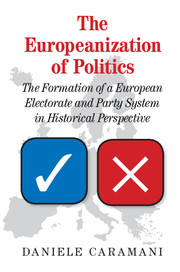 The Europeanization of Politics
The Europeanization of Politics from Part II - Analysis
Published online by Cambridge University Press: 05 November 2015
Introduction
Correspondence refers to the overlap or, conversely, the distinctiveness between the two levels of elections in Europe, national and supra-national. This chapter investigates the extent to which there is a distinct electorate and party system at the EU level, independent from national issues, party platforms, and alignments. The vertical correspondence of electoral behaviour between national and European elections is analyzed through a comparison of national elections and elections to the EP. Is there, and, if so, to what degree, a differentiated European party system or, on the contrary, is electoral behaviour in European elections a reflection of national political contests? And is there a trend in the progressive “emancipation” of the European party system from national politics over 30 years of European elections? This chapter investigates the origins of distinctiveness based on swings towards and against party families based on the previous chapter.
Since the first direct elections to the EP in 1979, European elections have been described as “second-order elections” (Reif and Schmitt, 1980). This label implies not only that European elections are (perceived as) less important than national elections in the member-states of the EU, but also that European elections are dominated by national factors. European electorates vote for the EP according to national criteria, campaigns are run on national issues, voters are guided in their voting choices by national party affiliations and electoral alignments, and leaders seek support on national policies and platforms. In sum, European elections are national contests “by other means”.
Over the past 30 years the EP has acquired new competences and strengthened those it already had. Decision making is systematically affected by European party federations, and groups consolidated in the EP. More generally, the process of integration has moved at an accelerated pace and public debates have gained strength in the wake of referenda on accession, common currency, and treaties and with the process of the EU's “constitutionalization”.
To save this book to your Kindle, first ensure [email protected] is added to your Approved Personal Document E-mail List under your Personal Document Settings on the Manage Your Content and Devices page of your Amazon account. Then enter the ‘name’ part of your Kindle email address below. Find out more about saving to your Kindle.
Note you can select to save to either the @free.kindle.com or @kindle.com variations. ‘@free.kindle.com’ emails are free but can only be saved to your device when it is connected to wi-fi. ‘@kindle.com’ emails can be delivered even when you are not connected to wi-fi, but note that service fees apply.
Find out more about the Kindle Personal Document Service.
To save content items to your account, please confirm that you agree to abide by our usage policies. If this is the first time you use this feature, you will be asked to authorise Cambridge Core to connect with your account. Find out more about saving content to Dropbox.
To save content items to your account, please confirm that you agree to abide by our usage policies. If this is the first time you use this feature, you will be asked to authorise Cambridge Core to connect with your account. Find out more about saving content to Google Drive.